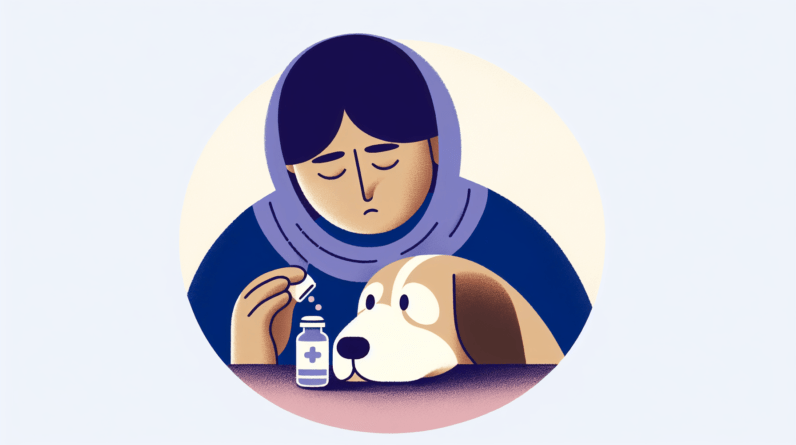
Are you wondering about the consequences of refusing to vaccinate your child? It’s a question that many parents have grappled with, especially in recent times when there is significant debate surrounding vaccination. While it’s your right as a parent to make decisions for your child, it’s essential to understand the potential implications of opting out of vaccines. In this article, we will explore the possible outcomes, both on an individual and a societal level, of refusing to vaccinate your child. It’s a complex and important topic that deserves careful consideration and open dialogue. So, let’s dive in and explore what might happen if you choose not to vaccinate your child.

Medical Risks
Increased risk of preventable diseases
Refusing to vaccinate your child puts them at an increased risk of contracting preventable diseases. Vaccines are designed to stimulate the immune system and protect against harmful pathogens. By not vaccinating, your child becomes vulnerable to diseases such as measles, mumps, rubella, pertussis, and polio, which can have severe health consequences.
Complications and hospitalizations
Without proper vaccination, your child is more likely to experience complications and require hospitalization if they contract a vaccine-preventable disease. These diseases can lead to serious complications such as pneumonia, encephalitis (inflammation of the brain), or even death. By choosing not to vaccinate, you are taking a risk with your child’s health and well-being.
Transmission to others
Refusing vaccination not only puts your child at risk but also poses a threat to those around them. If your unvaccinated child contracts a vaccine-preventable disease, they can unknowingly spread it to others, including infants who are too young to be vaccinated and individuals with compromised immune systems. By choosing to vaccinate, you contribute to the collective protection of your community and help prevent the transmission of diseases.
Legal Considerations
Vaccine requirements for school enrollment
Most countries and states have vaccination requirements for school enrollment. These regulations are in place to protect the health and well-being of all students. By refusing to vaccinate your child, you may face challenges when it comes to enrolling them in school. Schools often require proof of immunization to ensure a safe educational environment for all students.
Consequences for neglecting vaccination laws
Neglecting vaccination laws can result in various consequences. In some cases, you may face fines or penalties for non-compliance. Additionally, your child’s enrollment in school or participation in certain activities may be restricted or even denied. It is essential to familiarize yourself with the vaccination laws and requirements in your jurisdiction to avoid legal implications.
Liability in case of harm
If your unvaccinated child contracts a vaccine-preventable disease and spreads it to others, you may be held legally liable for the harm caused. By choosing not to vaccinate, you increase the risk of transmitting diseases to individuals who could suffer severe health consequences. Understanding your legal responsibilities and considering the potential liability is crucial to making an informed decision about vaccination.
Impact on Public Health
Herd immunity and its importance
Herd immunity is a critical aspect of public health that relies on a significant portion of the population being vaccinated. When a high percentage of individuals in a community are immunized, it creates a protective barrier against the spread of diseases. This not only safeguards vulnerable populations but also reduces the overall prevalence of infectious diseases, benefiting everyone in the community.
Increased risk for vulnerable populations
By choosing not to vaccinate, you put vulnerable populations at a higher risk of contracting vaccine-preventable diseases. These include infants, the elderly, pregnant women, and individuals with compromised immune systems. Vaccination helps protect these individuals who are more susceptible to severe complications and, in some cases, death. Considering the well-being of these vulnerable populations is an ethical responsibility.
Epidemic outbreaks
By refusing to vaccinate, individuals contribute to the potential for epidemic outbreaks. Vaccine-preventable diseases can spread quickly among unvaccinated populations, leading to outbreaks that can have far-reaching consequences. These outbreaks not only put lives at risk but also strain healthcare systems, disrupt daily life, and impose a heavy economic burden. Vaccination plays a vital role in preventing and minimizing the impact of epidemic outbreaks.
Ethical Considerations
Balancing individual rights with collective welfare
The decision to vaccinate raises ethical considerations regarding the balance between individual rights and collective welfare. While individuals have the right to make choices about their health, these choices can have implications for the well-being of others. Vaccination not only protects the individual but also contributes to the health and safety of the entire community. Balancing personal autonomy with the responsibility towards the common good is a moral challenge.
Responsibility towards community health
Choosing to vaccinate your child is an expression of responsibility towards the health of your community. By getting vaccinated, you help protect those who are vulnerable or unable to receive vaccines due to medical reasons. Taking into account the impact of your choices on the broader community demonstrates a sense of solidarity and empathy towards others.
Moral obligations as a parent
As a parent, you have a moral obligation to prioritize the well-being and safety of your child. This includes making decisions that are based on reliable scientific evidence and expert recommendations. Vaccination is a critical aspect of safeguarding your child’s health and preventing harm to others. Fulfilling your moral obligations as a parent involves considering the long-term consequences of your choices on your child’s health and the greater community.

Misinformation and Conspiracy Theories
Influence of false information
The spread of false information and conspiracy theories regarding vaccines has led to vaccine hesitancy and refusal. Inaccurate claims linking vaccines to autism or other health problems have been widely debunked by numerous scientific studies. However, the influence of false information can be significant, leading to unnecessary fear and doubt surrounding vaccines. It is essential to distinguish between credible sources and misinformation when making decisions about vaccination.
Dispelling common vaccine myths
To address vaccine hesitancy, it is crucial to dispel common myths and misconceptions. Understanding the scientific evidence and expert consensus is important in countering misinformation. Vaccines undergo rigorous testing and scrutiny before being approved, ensuring their safety and efficacy. Addressing concerns with accurate information can help alleviate fears and debunk myths perpetuated by false information.
Addressing concerns with accurate data
When faced with concerns about vaccination, it is important to seek accurate data and information from reputable sources. Healthcare professionals, scientific organizations, and government agencies provide evidence-based information on the safety, efficacy, and importance of vaccines. Engaging in open and honest conversations with healthcare providers is essential in addressing specific concerns and making informed decisions about vaccination.
Alternative Health Approaches
Exploring alternative health practices
While some individuals may turn to alternative health approaches, it is important to approach these practices with caution and critical thinking. Vaccine-preventable diseases have been effectively controlled through vaccination, which is based on extensive scientific research. Exploring alternative health practices should involve careful consideration of available evidence and consultation with qualified healthcare professionals.
Weighing risks and benefits
When considering alternative health approaches, it is crucial to weigh the risks and benefits carefully. Vaccination has a well-established track record of safety and effectiveness, supported by robust scientific evidence. Alternative health practices that claim to offer protection against infectious diseases may lack the same rigorous scientific scrutiny. Evaluating the potential risks and benefits is essential to making informed decisions regarding the health of your child.
Consulting qualified healthcare professionals
When exploring alternative health approaches, consulting qualified healthcare professionals is essential. They can provide expert guidance, assess the scientific validity of alternative practices, and offer personalized advice based on your child’s specific health needs. Engaging in open and honest conversations with healthcare providers ensures that you have the most up-to-date and accurate information to make informed decisions.
Parental Rights and Autonomy
Understanding parental rights
Parents have the right to make decisions regarding their child’s healthcare, including vaccination. However, these rights are not absolute and must be balanced with considerations for the health and well-being of the child and the broader community. Understanding the scope of parental rights within the context of public health is crucial to making responsible and informed decisions.
Informed decision-making
Making an informed decision about vaccination requires gathering accurate information from reliable sources, evaluating the available evidence, and consulting with healthcare professionals. Informed decision-making involves understanding the risks and benefits, considering the scientific consensus, and taking into account the potential impact on your child and community. Being proactive in seeking information empowers parents to make choices that prioritize the health and safety of their child.
Collaborating with healthcare providers
Collaboration with healthcare providers is essential in navigating the complex landscape of vaccination decisions. Healthcare professionals can answer questions, address concerns, and provide guidance based on their expertise and knowledge of the latest scientific research. Working collaboratively with healthcare providers fosters a partnership centered around the well-being of your child and ensures that decisions are made with the best available information.
Education and Awareness
Promoting vaccination education
Promoting vaccination education plays a vital role in addressing misconceptions and increasing awareness of the benefits of vaccines. Providing accurate information through various channels, such as public health campaigns, educational materials, and community events, helps combat vaccine hesitancy. Empowering individuals with knowledge equips them to make informed decisions based on scientific evidence and expert consensus.
Importance of accurate information
Accurate information is crucial in shaping public understanding and dispelling myths and misinformation surrounding vaccines. It is essential to rely on reputable sources, such as scientific organizations and government agencies, for up-to-date and evidence-based information. Emphasizing the importance of accurate information and critical thinking fosters a well-informed society capable of making responsible choices regarding vaccination.
Addressing vaccine hesitancy
Vaccine hesitancy, driven by concerns and doubts, can be addressed through education and awareness campaigns. Acknowledging and addressing individuals’ concerns with empathy, providing accurate information, and sharing personal stories and experiences can help alleviate fears and build trust. Engaging in open dialogues and fostering a supportive environment for discussion enables individuals to make informed decisions regarding vaccination.
Social Implications
Stigmatization and ostracization
Refusing to vaccinate may lead to social stigmatization and ostracization. Communities prioritize the health and well-being of their members, and failure to vaccinate can be seen as a disregard for the collective responsibility in protecting public health. It is important to foster understanding and respectful dialogue to address concerns and misconceptions without resorting to stigmatization.
Social responsibility and community trust
Vaccination is not only a personal choice but also a social responsibility. It contributes to the well-being and safety of the community as a whole. By choosing to vaccinate, individuals demonstrate trust in the scientific consensus, healthcare professionals, and the overall system of public health. Upholding social responsibility and fostering community trust strengthens collective efforts in protecting public health.
Support networks for vaccine decision-makers
Making vaccine decisions can be challenging, and individuals may benefit from support networks. These networks can provide a safe space for discussing concerns, sharing experiences, and accessing accurate information. Engaging with like-minded individuals or seeking guidance from healthcare professionals and community organizations can offer emotional support and help navigate the complex landscape of vaccination decisions.
Global Perspectives
Comparing vaccination policies worldwide
Vaccination policies vary across countries, reflecting differing approaches to public health and individual rights. Comparing vaccination policies worldwide sheds light on the diverse regulatory frameworks and their impact on public health outcomes. Such comparisons can help identify best practices and inform policy discussions aimed at improving global vaccination efforts.
International health implications
Vaccine decisions can have international health implications, given the interconnected nature of the world. In an increasingly globalized society, vaccine-preventable diseases can travel across borders, potentially leading to outbreaks in different regions. By considering international health implications, individuals can contribute to global efforts in promoting equitable access to vaccines and safeguarding public health worldwide.
Collaboration for global health security
Collaboration is key in addressing global health challenges, including vaccination. By collaborating with international organizations, governments, healthcare professionals, and researchers, individuals can contribute to global health security. Sharing scientific knowledge, resources, and expertise enhances the effectiveness of vaccination efforts and helps prevent the spread of infectious diseases on a global scale.
In conclusion, the decision to refuse vaccination for your child goes beyond personal choice. It carries medical risks, legal considerations, impacts public health, raises ethical questions, and is influenced by misinformation and conspiracy theories. Considering alternative health approaches, parental rights, education, awareness, and understanding global perspectives are essential elements in making an informed decision that prioritizes the health of your child and the broader community. Consultation with healthcare professionals and collaboration with trusted sources can guide parents towards responsible decision-making, ultimately contributing to the protection of public health and global well-being.







